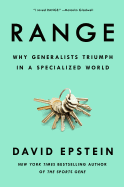
In the 21st-century world of 24/7 cable news and the Internet, there's no opinion lacking a highly credentialed expert to advance it. David Epstein's well-researched, lively Range: Why Generalists Triumph in a Specialized World sounds a note of caution when it comes to the credulous acceptance of these oracular pronouncements. Instead, Epstein (The Sports Gene) makes a persuasive case for the "advantages of breadth and delayed specialization" in shaping better leaders and problem solvers in a complex world.
Using his own life as a starting point (he detoured from a career in environmental science to work as an investigative journalist for Pro Publica and write for Sports Illustrated), Epstein offers a plethora of examples to support his thesis that "modern life requires range, making connections across far-flung domains and ideas." To nurture the talents of people best able to achieve that goal, he advocates for the idea of "match quality." It's a term used to describe the congruence "between the work someone does and who they are." As he explains, the search for that match is the defining characteristic in the lives of successful late starters like Vincent Van Gogh or 102-year-old Frances Hesselbein, who took her first professional job at age 54 and now heads a leadership institute that bears her name, after retiring from her much-admired tenure as CEO of the Girl Scouts of America.
Range is by no means a brief for ignorance or for the validation of ill-informed guesswork. Rather, Epstein offers an exhilarating vision of how smart, curious people can more skillfully apply their best thinking to change and improve the world. --Harvey Freedenberg, freelance reviewer

